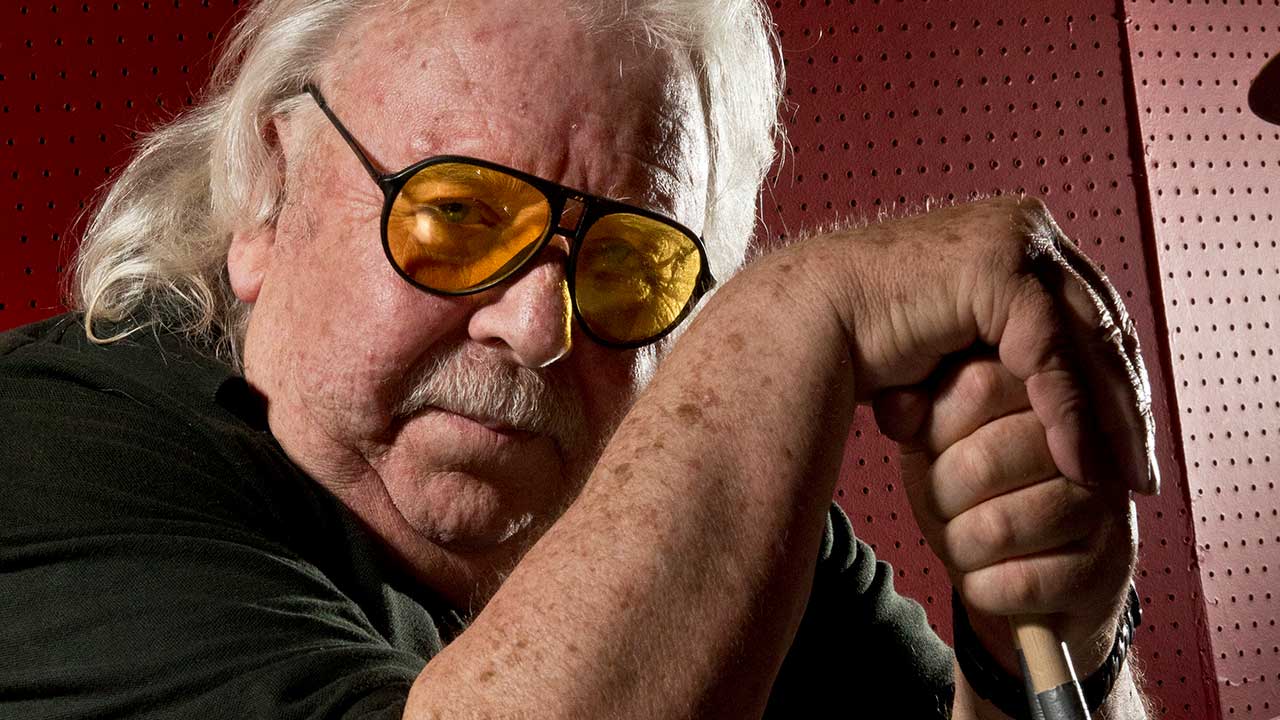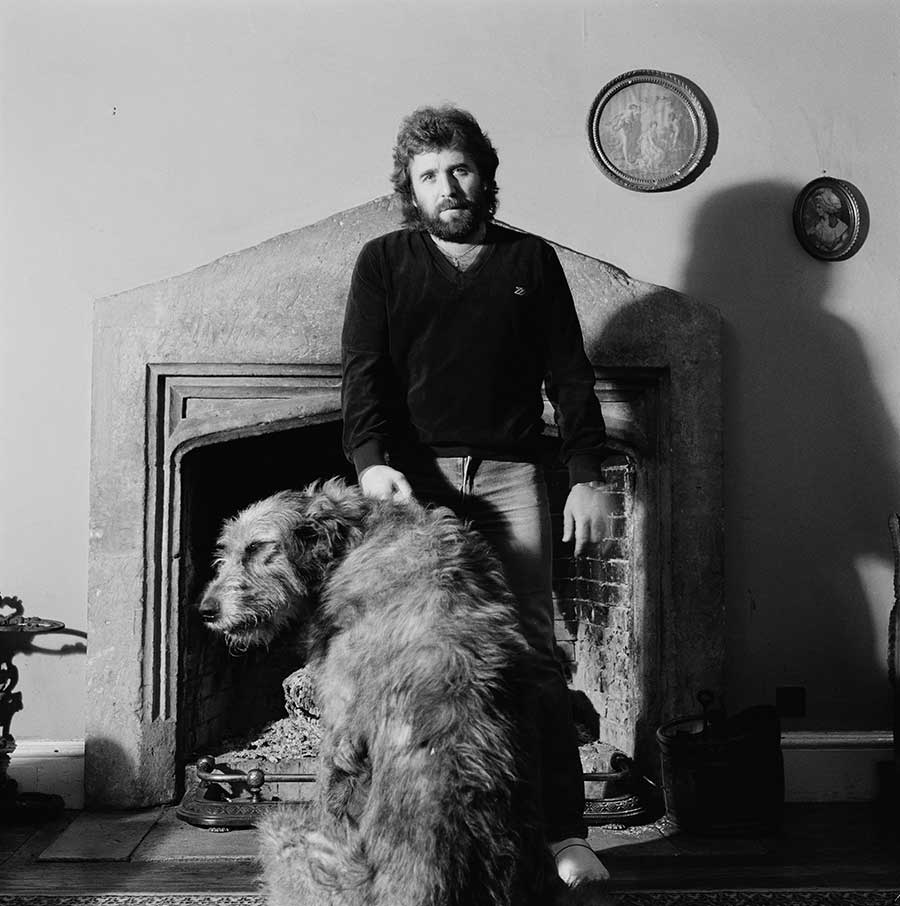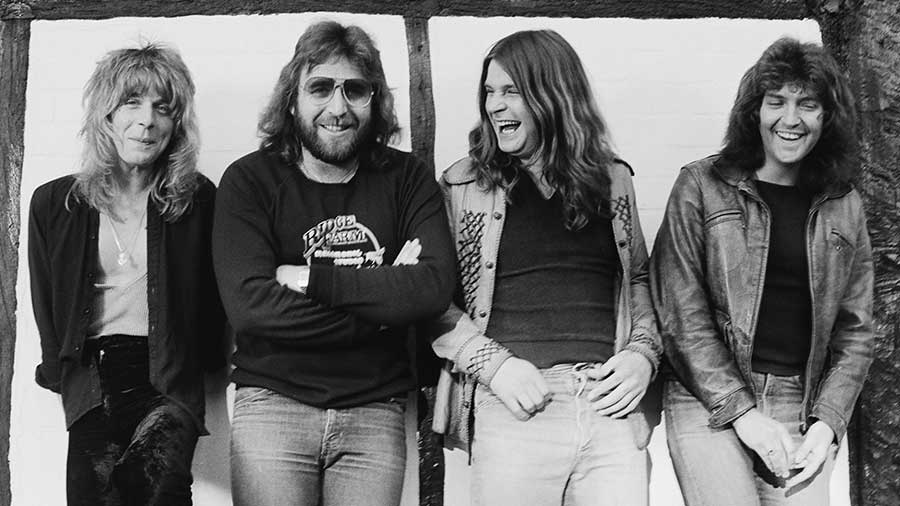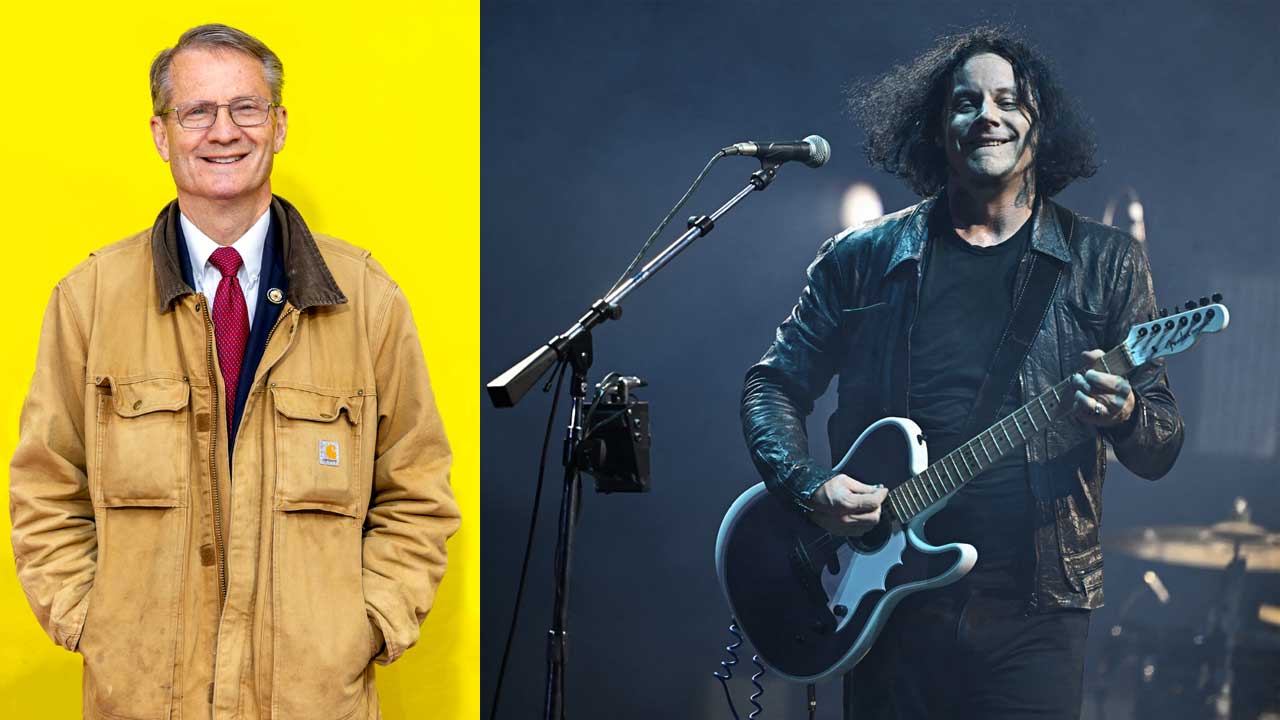Lee Kerslake: the last interview
In 2019 Lee Kerslake sat down for his final Classic Rock interview. He talked about Uriah Heep, fighting and forgiving the Osbournes, and his battles with illness

It’s early February 2019. It could be the last February Lee Kerslake will ever see. But, considering everything that he’s been through, he’s doing pretty well. Diagnosed with prostate cancer in 2014, he’s hanging on in there, although more recently, with the disease having spread inside his body, a doctor advised him to arrange his affairs over the following eight months.
“I have bone cancer, a complicated type that’s very nasty,” he confides, seemingly without a flicker of emotion. “It’s gone right down my spine. Five years ago I was told I had four more years to live. The cancer then came back with a vengeance. Now I’ve got diabetes, psoriatic arthritis [a painful condition which causes inflamation of the joints] and a heart murmur. One more and I’d have hit the jackpot.”
The dry chuckle that follows seems genuine. “I’ve got no choice but to laugh,” he shrugs. “And of course music helps me to keep on fighting it.
“I’m living on borrowed time,” he continues. “I’ve got between four or five months. Next week they’re giving me a new, untried drug. It’s very, very strong and extremely expensive. My response was: ‘Oh, goody, it must work.’ That’s a joke, of course – nobody knows. And I’ve come to terms with it.”
Kerslake’s apparent good cheer is little short of astonishing. Having been forced to step down from Uriah Heep’s drum stool some 11 years ago, he and his wife Susan now live in a modest flat situated a stone’s throw from one of Britain’s prettiest public parks, Crystal Palace. Springtime is approaching when the drummer and songwriter collects me from the station in his car, and I wonder whether he walks his rescue dog Blaze amid its leafy beauty.
“Not any more,” he answers casually. “It’s too much for me now. These days I’m a raspberry ripple [rhyming slang for ‘cripple’].”
These words seem strange coming from the proverbial bloke’s bloke who in his prime was so powerful and bulky that his Uriah Heep bandmates nicknamed him The Bear. And yet, in spite of all that life has thrown at him, Kerslake exudes an air of peace and contentment. What he doesn’t project are sorrow, self-pity or awkwardness (from an interviewer’s perspective, at least) that you might reasonably expect during a conversation with a dying man. If there’s an extra spring to his step, it’s thanks to Sharon and Ozzy Osbourne.
Sign up below to get the latest from Classic Rock, plus exclusive special offers, direct to your inbox!

Six months ago such a statement would have been laughable. Back in 1980, following eight years with Heep, Kerslake joined Ozzy, fresh out of Black Sabbath, in a new group called Blizzard Of Ozz. Having played a huge role in the band’s phenomenal success, Kerslake and bassist Bob Daisley were, in Lee’s words “thrown out of the band because Sharon wanted newer members”, and their contributions to a second album, Diary Of A Madman, for which Kerslake insists he co-wrote several tracks, went unacknowledged (Daisley also claimed a co-production role); touring musicians Rudy Sarzo and Tommy Aldridge appeared on its sleeve instead.
Kerslake and Daisley both allege that they didn’t receive performance royalties, although they did receive some writing monies. As the two sides entrenched – Kerslake and Daisley protesting vociferously from the rooftops, the Osbournes in fierce opposition, claiming that Lee and Bob were simply hired hands – a bitter feud began.
In 1986 the pair sued Jet Records, the company behind the two albums, and won. Later it emerged that the Osbourne camp had bought the rights to the first two records, rebranding them as Ozzy solo releases. So Lee and Bob sued the new owners… and lost, the statute of limitations – the time frame in which they needed to bring the case to court – having expired.
Adding insult to injury, when those albums were reissued in 2002, Ozzy’s then-rhythm section of Robert Trujillo (now with Metallica) and Mike Bordin (formerly with Faith No More) had overdubbed the pair’s existing parts. The original performances were reinstated almost a decade later, but most considered it a low blow – petty gamesmanship that many would find it impossible to forgive. And yet that’s exactly what Kerslake has done. However, it’s been a long road.

The healing began less than a year ago when Kerslake wrote a deathbed plea to Ozzy and Sharon, requesting platinum discs for Blizzard Of Ozz and Diary Of A Madman.
Later on he issued a statement: “Life is too short and I have so much admiration for Sharon as a businesswoman. I’d like to think that Sharon, Ozzy and I are friends.” It worked. Sharon placed a call to Lee’s manager, apparently “with a tear in her eye”, granting the request and relaying Ozzy’s best wishes. The precious discs weren’t too far behind.
With obvious contentment, Lee produces a handwritten letter from Ozzy and reads it aloud. The tone is friendly enough. Written before the forced cancellation of Ozzy’s recent touring, Ozzy refers to his own ailments and bemoans the passing of time since they last met – “it must be at least thirty five years or more” – ending with the words: “God bless you [and] stay safe.”
Although the letter carries no reference to guilt nor apology for any past transgression, merely receiving it satisfies Kerslake.
“That’s it,” he says, smiling. “Everything is done and dusted.”
You are entitled to some skepticism. After rancour, resentment and acrimony over four decades, most people could not simply forgive and forget in such a casual manner.
“Since I’ve known that I’m dying I no longer want to hold a grudge,” Lee explains patiently. “I want to go with a clear conscience. They [Ozzy and Sharon] know I haven’t got much longer left. They [the discs] are all I wanted.”
The outstanding royalties would have been nice too, though, surely?
“I didn’t want their money or any of the worries about that,” he says, “though of course some might have come in handy, but it ain’t gonna happen,” he responds in an even voice.
“That,” he adds, pointing across the room at the package containing discs that arrived from California, “is everything. I’ve kept on and on about getting it. I fought the case, and in doing so I lost an absolute fortune.”
Kerslake and Daisley’s courtroom defeat to Ozzy and Sharon probably played its part in Lee’s whole regrettable spiral, which saw him declare bankruptcy and lose his house.
“Health-wise everything went downhill afterwards,” he agrees. “But I’ll live with that and I’ll die with it.”
And you’ve really forgiven them? Seven years ago you told an interviewer: “The fact is that Sharon is evil, why she hates [Bob and myself] I have no idea.”
“Look, enough water has gone under the bridge and I’m willing to forget the nasty bit. The letter was enough for me to say that’s it, the hatred is over.”
As if to prove this point, a few days after this interview took place, and following the latest drama in the Osbournes soap opera, Kerslake took to Facebook to plead: “People, please lay off of Sharon. Ozzy is very ill and she has enough to contend with.”
This is remarkable. But then Lee Kerslake has lived a remarkable life.

He was born in Winton, near Bournemouth, in 1947. His first band of significance was The Gods. An outstanding talent pool, at one time or another their line-up would include Greg Lake, future Rolling Stones guitarist Mick Taylor, guitarist Alan Shacklock, who became a star with Babe Ruth, the Glascock brothers Brian and John (the latter would join Jethro Tull), future Heep co-founder Paul Newton and, most significantly from a Kerslake viewpoint, Ken Hensley.
The latter, flamboyant, exceptionally talented and prone to displays of megalomania – during his final days with Heep the keyboard player, guitarist and songwriter demanded his own personal lighting rig – was destined to become a pivotal figure in Kerslake’s fortunes.
Across more than half a century the pair have been blood bothers as well as sworn enemies, and all stages in between. The Gods made three albums, including a provocative final one called Orgasm under the handle Head Machine, and enjoyed a successful residency at London’s Marquee club earning the then-princely sum of £25 a week. Then at Christmas time in 1969 Hensley left to join the embryonic Uriah Heep (then still known as Spice).
Although Heep’s ascent over the course of three albums was gradual, by 1972 the five-piece stood on the precipice of something very big indeed. Their label, Bronze Records, drove the band hard – some might say too hard.
Somehow they released two albums each year and spent the remaining 11 months on tour. The third album, 1971’s Look At Yourself, finally propelled them into the Top 40 at home. Doors were also opening in America, where the band would soon be supported by Kiss. And although Heep had got off to a bad start with the US press (a critic from Rolling Stone promised: “If this band makes it, I’ll have to commit suicide”), a begrudging respect was blossoming. Kerslake was enjoying life with the National Head Band when he was invited to join Heep in late 1971. He felt bad about leaving his colleagues in the lurch – that is until he was told about how much he would earn.
Decades later, it’s difficult to explain just how big Uriah Heep became in what seemed a fairly short amount of time. This rapid rise had much to do with the star quality of their charismatic frontman, David Byron.
“When David was on form nobody could touch him,” Kerslake exclaims. “He was unique and unafraid of anyone. I remember a gig opening for Rod Stewart, who was one of the best showmen in rock. After we came off, Rod asked: ‘How the fuck am I supposed to follow that?’”
Heep’s breakthrough, with the album Demons And Wizards, was just around the corner. But by the time it arrived, four-fifths of the line-up and Gerry Bron of Bronze Records were at loggerheads. As their label boss, producer and manager, Bron had manoeuvred himself into the wearing of three hats, something that Kerslake feels would today be deemed “illegal”.
“It’s a conflict of interests,” he maintains. “Gerry and I never really got on. We clashed almost every step of the way, I admit that.”
With Ken Hensley having assumed the role of chief composer, Bron was probably right to encourage the productivity of his golden goose, although of course this perceived favouritism was divisive in a group riven with individual quarrels, including a rivalry between Hensley and the increasingly wayward and self-destructive Byron.
The latter was sacked after the appropriately titled High And Mighty album in 1976. By that point bass player Gary Thain had died of a heroin overdose, something that guitarist Mick Box has always attributed to the workload forced upon them. Kerslake wasn’t the only one complaining about the state of affairs, but his voice might have been the loudest.
“Ken wanted to control the band, and he couldn’t, not with myself and Micky around,” he sighs now. “But there were times when I had to say to Micky: ‘I can’t fight all of the problems, because I haven’t the strength, not alone’. It caused me to leave the band. And I’m glad that I did so.”
It all came to a head in October 1979. Kerslake still simmers when recounting his first exit from Uriah Heep – at the hand of Gerry Bron, although the orders came from Ken Hensley.
“Bron actually called me irrelevant,” he seethes. “This was a man who took fifty per cent of our earnings but stopped paying us for a year to finance his airline project. Finally I told him to stick Uriah Heep up his arse – it was the only place it would fit. But when Gerry ordered me from his studio I replied: ‘When I’m ready; I bought one fifth of this place’.”
Lee had toyed with a solo project, but then he received a call from the German concert promoter, Ossy Hoppe, who revealed that Ozzy had a new band but didn’t have a drummer.
“What I did was – and this is the absolute truth – I auditioned them as they auditioned me,” Lee beams. “I wasn’t going straight back into another band to be treated again like a second-class citizen. I knew Bob from his days with Widowmaker, but I’d never seen or heard Randy before. Randy was the tiniest kid, so thin and good looking.
“They were both setting up when I arrived at the studio,” he continues. “And then Ozzy arrived – with his hair cut off and wearing a fur coat he looked like a grizzly bear.”
Lee remembers that after powering through a single number, possibly I Don’t Know, “Randy jumped up in the air and roared: ‘We’ve got ourselves a fucking drummer!’” igniting a warm friendship between the English drummer and the guitar prodigy from California.
Although the writing for the debut was “almost finished” when Kerslake joined Blizzard Of Ozz, he added drum parts and threw in suggestions for words and music. When Jet Records boss Don Arden heard it, he commanded: “Get straight back into the studio and make another one, because you’re going to be away for at least a year and a half on tour in America.”
And so it proved. Kerslake and Daisley became scapegoats when Sharon Osbourne demanded the band should play two shows a day in certain cities. Everybody else – including Ozzy and Randy – opposed the proposition, but because Lee had been the messenger his card was marked. “Ozzy had said: ‘No, no, I just can’t do it’, and started shitting himself,” Lee insists.
This was an oddly vulnerable point for Ozzy, who at the start of his solo career seemed to be lacking confidence. “He was always a bag of nerves before going on stage,” Lee agrees. “But once out there he became the Ozzy character that we know.”
The fleet-fingered, classically trained Rhoads soon became a hot property, his imaginative technique prompting Guitar Player magazine to vote him the Best New Talent of 1981. Always seeking to improve, Rhoads sought out classical guitar tutors on the road. Kerslake had no doubts that had Rhoads not died tragically in the plane crash during the touring for Diary, the developing star would have moved away from rock and into another area of music.
“Even before Bob and I were sacked, Randy had told a friend of Bob’s that he was leaving the band,” Lee claims. “He wanted to teach classical guitar. But of course he never got the chance. What happened – going up in a plane, with a pilot on cocaine, which dive-bombed the bus and the wing catching the bus – was completely stupid. But Randy was going to leave, there was no question of that. And he would have found success in anything he turned his hand to.”

Lee stepped up with the writing of Diary Of A Madman, and claims he had a hand in most of its eight songs, although this would not prevent his ruthless sacking before a second bout of touring. However, the timing of getting the axe and a return to a reconstituted, revitalised Uriah Heep for their 1982 album Abominog now seems almost heaven-sent.
“Micky Box wanted to put the band back together again. Oh, how I loved that period and Abominog,” Lee exclaims happily. The reason was simple.
“There was no Gerry Bron!” he says, laughing loudly. “Gerry had said: ‘I don’t like those songs.’ And although the album came out through Bronze, he wasn’t the producer. Abominog was a very successful record for us.”
Abominog and its follow-up Head First both allowed Heep to enter the 1980s with a fresh and contemporary-sounding reboot. There followed good times and bad, but even at the band’s nadir during the early 90s Lee’s loyalty remained unquestioned.
In ’04 he was part of Living Loud, a project featuring Daisley, the Deep Purple duo of Steve Morse and Don Airey, and singer Jimmy Barnes.
Eventually, though, in 2007 declining health forced him to walk away from his beloved Uriah Heep for the final time.
“That was the hardest thing I ever had to do, but I knew I was ill,” he sighs. “I was so tired that I screwed up on stage – I couldn’t remember one of the songs. I had to own up to Micky Box: ‘I can’t play any more, mate. There are too many things wrong with me.’ So I went to Portugal for a break, came back, and that’s when the doctors told me I had cancer.”
There followed a course of chemotherapy, “which went slightly wrong”, and a period of time spent in isolation wards. Kerslake recalls being at Lewisham Hospital and deciding that he’d had enough, and informed the medical staff that he was going home.
“A doctor said: ‘Do so and you’ll be dead by the time you get there’. Bang – that’s when the severity hit me. I was told that my condition was worse than AIDS; contract even a touch of a cold and I was a goner.”
Heep brought in Russell Gilbrook as Kerslake’s replacement. Twelve years and four albums later, Gilbrook remains with the group, who have undergone yet another revival in fortunes, including last year’s well-received Living The Dream album. The ever-candid Kerslake praises his successor, but admits it took time adjusting to Gilbrook’s ‘busier’ style.
“At first Russ thrashed around like a lunatic on The Muppet Show, but he’s learned to pull things back,” he says, smiling. “Now he’s tremendous.”
While still with Heep, despite having vowed never to absolve the “skulduggery” of the past (“Ken’s become a born again Christian – what bollocks! He did evil things,” Lee once thundered), Kerslake did eventually forgive Hensley, when the keyboard player made a guest appearance with the band at an event called The Magician’s Birthday Party in London in 2001.
“Ken walked into rehearsals and gave me a huge hug. I was so glad [the bitterness] was over,” Kerslake reminisces. “We had both suffered for the negativity. It was time to let it go.”
Kerslake and Hensley appeared together again with Uriah Heep in 2015 at a one-off show in Moscow, playing alongside the current line-up.
“I’d love to have done a couple more of those, but it wasn’t to be,” the drummer says ruefully. Kerslake did make another cameo with Heep, appearing from the wings at the band’s Shepherd’s Bush Empire gig back in December 2018. It was just days after he’d announced his terminal illness, and there wasn’t a dry eye in the house as he sang backing vocals on Lady In Black with Box and frontman Bernie Shaw, and also joined Gilbrook on the drum riser to hit a few cymbals.
“It was a beautiful experience, but back in the dressing room I broke down and cried,” he says. “I have given forty years of my life to that band, and to know there’s not much longer left…” His voice trails off. “I’d still love to do something bigger with me, Micky and Ken.”
Kerslake’s reconnection with Hensley is such that, should remaining time allow, there’s talk of working together again in some capacity. Meanwhile, there’s a crowdfunding appeal for an autobiographical documentary. Titled Not On The Heep, it was born in the most random manner after Kerslake happened to meet and strike up a conversation with the British actress-turnedBAFTA-nominated writer and director Tayla Goodman in Crystal Palace Park.
The documentary will feature appearances from Def Leppard’s Joe Elliott and Deep Purple’s Ian Paice. With the project already “two-thirds completed”, Lee hopes to include David Gilmour, Gene Simmons, Paul Stanley and a number of other musician pals.
“The point of the film is friendship,” Lee explains. “I’m emphasising the camaraderie between musicians who remain mates even when they don’t speak to one another for twenty or thirty years.”
He also has a new studio album called Eleventeen on the horizon.
“It’s a varied mix of styles, from a ballad about my mum to a singalong pub song called A Port And A Brandy,” he reveals. “With all of my illnesses, it took three and a half years to make. Ideally the documentary and album will be released simultaneously, but they are what they are and I’m proud of them.”
Besides his acknowledgement from Ozzy, Kerslake recently flew to California to be inducted into the Hall Of Heavy Metal History (Bob Daisley, unable to attend, sent John Sykes as a proxy).
Kerslake’s eyes have threatened to produce tears throughout our conversation today, but on his face now is a massive grin.
“I’m smiling because I’ve seen life,” he explains. “I was a few hundred feet away when those planes crashed into the Twin Towers on 9/11 [Lee was in New York fighting the Osbournes on that fateful day in 2001]. The experience had a big effect upon me.”
Were it possible to go back and alter some things from along the way, what would they be?
“I don’t think I’d change anything, except the illnesses,” he says. “I made my mistakes, and I tried to learn from them.”
As a much younger man, Kerslake was feisty and bullish. Today his inner calm and dignity are impressive.
“I was full of energy back then; I could go three days without sleep. But I never had an ego. I always stayed myself.”
Is it fair to say he could be feisty and short-tempered in his youth?
“Maybe,” he says, grinning. “I lost my rag because I always knew what I wanted – and I didn’t like people standing in my way.”
How would he like to be remembered?
“As one of the great drummers in rock music and as a songwriter,” is the solemn response. “I’m under-appreciated as a writer. People just don’t know that me, Randy and Bob wrote Diary Of A Madman. I hope people think of me as a decent human being. I don’t think I’m an asshole, I like myself.”
Forgiveness for Ozzy and Sharon and also for Hensley is one thing, but Kerslake refuses to extend it to the late Gerry Bron, who passed away in 2012.
“I could go on forever about how badly Gerry ripped off the band and me, but he’s dead now,” he states. “Let him rest in peace, and I’ll keep on going for as long as I can.”
Preparing to take my leave, I ask him where he’ll hang his precious platinum discs.
“In the bedroom, so I can see them when I drift off to sleep and again in the morning,” he replies. “I worked hard for them, so why not?”
This feature originally appeared in Classic Rock 261, in March 2019.

Dave Ling was a co-founder of Classic Rock magazine. His words have appeared in a variety of music publications, including RAW, Kerrang!, Metal Hammer, Prog, Rock Candy, Fireworks and Sounds. Dave’s life was shaped in 1974 through the purchase of a copy of Sweet’s album ‘Sweet Fanny Adams’, along with early gig experiences from Status Quo, Rush, Iron Maiden, AC/DC, Yes and Queen. As a lifelong season ticket holder of Crystal Palace FC, he is completely incapable of uttering the word ‘Br***ton’.
